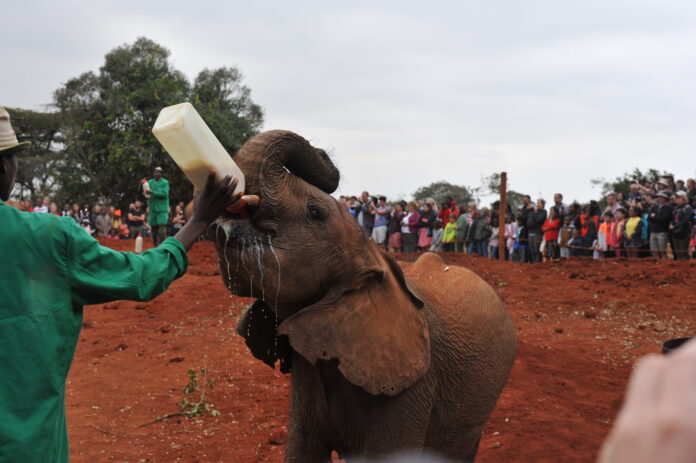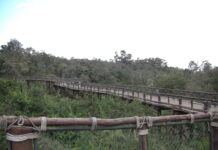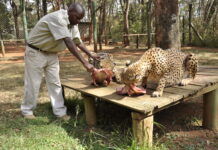Introduction to Sheldrick Elephant Orphanage Nairobi
History and mission of the Sheldrick Elephant Orphanage
The Sheldrick Elephant Orphanage has a rich history rooted in compassion and a deep commitment to wildlife preservation. It was founded by Dame Daphne Sheldrick and her late husband, David Sheldrick, who were both renowned conservationists. Their mission was to rescue and rehabilitate orphaned elephants, providing them with a safe haven and giving them a chance to return to the wild.
The orphanage has successfully raised and reintegrated over 230 elephants into protected areas, making it one of the most successful elephant rehabilitation programs in the world. The dedicated team at the orphanage works tirelessly to provide round-the-clock care for the young elephants, ensuring their physical and emotional well-being.
How to visit the Sheldrick Elephant Orphanage
Visiting the Sheldrick Elephant Orphanage is an unforgettable experience that allows you to witness the incredible work being done to save these majestic creatures. To visit the orphanage, you must book a tour in advance. The tours are conducted in small groups to ensure a more intimate and informative experience.
To book a tour, you can visit the official website of the Sheldrick Wildlife Trust, the organization that runs the orphanage. The website provides detailed information on tour availability and booking procedures. It’s important to note that the orphanage is open to visitors only during specific visiting hours, so it’s essential to plan your visit accordingly.
What to expect on a tour of the Sheldrick Elephant Orphanage
During the tour of the Sheldrick Elephant Orphanage, you can expect to get up close and personal with the orphaned elephants. The visit begins with an educational presentation, where you’ll learn about the orphanage’s history, conservation efforts, and the individual stories of the elephants in their care.
After the presentation, you’ll have the opportunity to witness the feeding of the baby elephants. This is a truly heartwarming experience as you watch the elephants eagerly gulp down bottles of specially formulated milk. The keepers will share fascinating insights about each elephant’s unique personality and the challenges they face in their journey to rehabilitation.
Following the feeding, you’ll have a chance to observe the elephants as they play and interact with each other in their spacious enclosures. The keepers will be available to answer any questions you may have and provide further information about the orphanage’s conservation initiatives.
The impact of the Sheldrick Elephant Orphanage on elephant conservation
The Sheldrick Elephant Orphanage has made a significant impact on elephant conservation efforts in Kenya and beyond. By rescuing and rehabilitating orphaned elephants, the orphanage plays a crucial role in preserving the future of these magnificent creatures.
One of the primary goals of the orphanage is to reintegrate the elephants back into the wild. Through a meticulous process that involves gradually introducing them to protected areas, the orphanage ensures that the elephants develop the necessary skills to survive in their natural habitat. This approach has been remarkably successful, with many former orphans now leading independent lives in the wild.
Moreover, the orphanage actively contributes to research and conservation initiatives aimed at protecting elephants from poaching and habitat destruction. By raising awareness about the plight of elephants and advocating for their protection, the orphanage serves as a powerful voice for the conservation of these gentle giants.
Volunteer opportunities at the Sheldrick Elephant Orphanage
If you’re passionate about elephant conservation and want to make a direct impact, the Sheldrick Elephant Orphanage offers volunteer opportunities. As a volunteer, you’ll have the chance to work closely with the elephants, assisting in their care and rehabilitation.
Volunteers play a vital role in ensuring the well-being of the elephants, from preparing their milk bottles to assisting with their daily exercises and socialization. It’s an incredibly rewarding experience that allows you to contribute to the orphanage’s mission firsthand.
To become a volunteer, you can apply through the official website of the Sheldrick Wildlife Trust. The application process involves submitting an application form, providing references, and demonstrating your commitment to conservation. Please note that volunteer positions are highly competitive, and it’s advisable to apply well in advance.
Frequently asked questions about the Sheldrick Elephant Orphanage tour
-
- How long does the tour of the Sheldrick Elephant Orphanage last? The tour typically lasts around one hour, including the educational presentation, feeding, and observation of the elephants.
-
- Can I touch or interact with the elephants during the tour? No, touching or interacting with the elephants is not allowed during the tour. The orphanage prioritizes the elephants’ well-being and aims to minimize human interference.
-
- Are cameras allowed during the tour? Yes, cameras are permitted during the tour, and you’re encouraged to capture the special moments. However, the use of flash photography is prohibited.
Other elephant conservation organizations in Nairobi
While the Sheldrick Elephant Orphanage is an incredible institution, there are other organizations in Nairobi that are also dedicated to elephant conservation. These organizations work in collaboration with the orphanage and contribute to the broader efforts of protecting elephants.
One such organization is the David Sheldrick Wildlife Trust, founded by Dame Daphne Sheldrick in memory of her late husband. The trust focuses on anti-poaching efforts, habitat protection, and community outreach programs to address the root causes of elephant poaching.
Another notable organization is the Elephant Orphanage Project, which operates a sanctuary for orphaned elephants. The project aims to provide long-term care for the elephants and promote research and education on elephant conservation.
Tips for responsible tourism at the Sheldrick Elephant Orphanage
When visiting the Sheldrick Elephant Orphanage, it’s essential to practice responsible tourism to ensure the well-being of the elephants and support their conservation efforts. Here are some tips to keep in mind:
-
- Respect the rules and guidelines set by the orphanage. These rules are in place to protect the elephants and provide a safe environment for their rehabilitation.
-
- Keep a safe distance from the elephants and avoid any sudden movements or loud noises that may startle them. Remember, they are still wild animals.
-
- Do not litter or leave any trash behind. Help keep the orphanage and its surroundings clean and free from pollution.
-
- Avoid using flash photography during the tour, as it can be distressing to the elephants. Instead, opt for natural lighting to capture your memorable moments.
Conclusion and the importance of supporting elephant conservation efforts
In conclusion, the Sheldrick Elephant Orphanage is a remarkable institution that has made a significant impact on elephant conservation. Through their dedication and expertise, the orphanage provides a second chance for orphaned elephants, ensuring their well-being and eventual return to the wild.
Visiting the orphanage offers a unique opportunity to witness the incredible work being done and learn about the challenges faced by elephants in the wild. By supporting the orphanage through tours, donations, or volunteering, you contribute to the preservation of these majestic creatures and help secure a brighter future for them.
Let us join hands in supporting elephant conservation efforts and ensuring that future generations can continue to marvel at the beauty and grace of these intelligent beings.
To learn more about the Sheldrick Elephant Orphanage, book a tour, or find out how you can support their conservation efforts, visit the official website of the Sheldrick Wildlife Trust. Together, we can make a difference in the lives of orphaned elephants and protect their natural habitat for generations to come.










Thanks for sharing. I read many of your blog posts, cool, your blog is very good.